Text



—Assad Zaman: "I'm still learning so much about Armand. Even after we finished filming, and like sort of ruminating on it, and watching the season as it comes into fruition. I still ask myself, what keeps him carrying on? And I don't know if I've fully worked it out yet myself. I know that he seems to find things that cling on to life. He's such a desperate character." ▶ Source Bonus:

809 notes
·
View notes
Text
It’s so funny that Armand has “ethical” eating habits for a vampire. He finds people he thinks deserve or want to die, and then he convinces them to play a game of cat and mouse with him, and he gets so visibly excited about it he’s openly flirtatious. Then he chases them through the streets for a few hours. Basically, he’s torturing them. He’s playing with his food. He’s having fun pretending to hunt. “Pretend” because if he was really hunting it wouldn’t take him any time at all. Then, once he catches them, he goes through their mind like a filing cabinet and brainwashes them into thinking they want to die, and then he kills them painlessly, which might sound better than throat-ripper Lestat’s modus operandi, but what Armand really does is subject people to physical and psychological torture for hours before removing their agency in their final moments. It’s worse. He doesn’t even leave people with their minds or dignity intact. No resistance. No hope. No clarity. Not even your final thoughts are your own. It’s presumably something Armand’s injected into your mind that he thinks you’ll like. He guts your mind like a fish before doing the same thing to your body and then goes home and is like, wow, another ethical meal for me, unlike all those savages that take bites out of random strangers. Good job, me.
10K notes
·
View notes
Text
Jelly Roll Morton and Stories of Storyville in IWTV

This is a picture of the real "Jelly Roll" Morton, born Ferdinand Joseph LaMothe, who appears in Interview with the Vampire S1 Ep3 playing in the Azalea.
Morton was born into a wealthy Creole family, and raised by his great-grandmother who loved French opera. While he grew up in a musical household, he was initially wary of learning the piano in case he would be “misunderstood” and seen as a “sissy”, but after hearing a man playing ragtime decided to learn. Telling his extremely Catholic great-grandmother that he had a job as a night watchman, he was only a teenager when he started playing piano in the brothels of Storyville. He changed his surname both so he wouldn’t embarrass his family and so it would sound more English, and chose “Jelly Roll” after either the slang for women’s genitalia or a sex move. (Apparently he was so skilled he could improvise along to a sex worker’s movements through a peephole – they would tip him for how well he could match them!!) Unfortunately he was caught when he was seventeen, and his great-grandmother cast him out of the house, saying he played the devil’s music. Despite this, he remained devoutly Catholic until his death. At this point he began touring America. He was an extremely talented pianist, composer, and arranger, and was the first person to commit many jazz standards to paper.
I think there’s a definite echo of inspiration there for Louis in the show, especially with the relationship Louis has with Florence.
However, even more interesting to me is Jelly Roll Morton’s own interview. In 1938, folklorist Alan Lomax invited Morton to be interviewed about Storyville and to record him singing the songs he’d played and heard there. Morton was reluctant to be interviewed at first, but he finally agreed, and the interview sprawled over eight hours of music, singing, and storytelling. Many of the songs were so sexually suggestive that they were censored, and the full version only became publicly available in 2005!
You can listen to him here at 17 mins, playing along to his own words. Jacob Anderson listened to his songs when getting into character for Louis, and I think you can hear a little bit of Morton's cadence in his voice.
But – there are key inconsistencies. He claimed to be descended directly from France, which is believed to be an attempt to hide his mixed-race background in an era of strict segregation. Just three years after this interview, a whites-only hospital would cause his death through denying emergency care. He also claimed to have been born in 1885 - he was likely born closer to 1890, but he had also written it as 1884 when he was drafted. His actual birth date was never recorded. Some scholars assume that he was just making a guess each time (1884/5 isn’t a big difference), but others accuse him of posing as older than he was in order to take credit for inventing jazz.
So why does Louis claim Lestat inspired the Wolverine Blues?
Historical detailing/Easter Egg
As I've mentioned, I think there may be some inspiration in Louis' character and Jacob Anderson did listen to him. It also ties the story into real New Orleans history in a fun way, as in 1910 it’s completely believable that Morton would have been in New Orleans and broken off his contract suddenly to travel to Chicago. Lestat calling him “Ferdinand” is also a great subtle dig, I had no clue on first watching, but Jelly did not like being called that name by strangers, nor give it out. Not an issue if you’re a mind-reading vampire.
Daniel also specifically references "Ken Burns" who has a documentary on Jazz including Morton, that was one of my sources and I imagine one or more writers watched the first episode for its research on jazz in Storyville.
Lestat's relationship to art and race
It mirrors the conversation which opens the episode, where Lestat comments on Jackson Square being modelled after Place des Vosges, and is frustrated when Louis points out that the heads of runaway slaves were displayed in it. Lestat views music and art as separate to humanity, so will not consider the racism which underlies his disdain for ragtime and jazz. Claudia later calls out the racist dynamics of his view of the superiority of European classical music.
New Orleans is the home of jazz, but in this period a lot of white residents were not happy with that. In the Burns documentary he reads from The New Orleans Times Picayune, in which white journalists disparaged the claim, viewing it as an insult, and jazz as symptomatic of humanity being degenerate (alongside “dime novels” and “donuts”).
Louis crediting the Wolverine Blues to a white man is a provocative statement which gives Daniel pause, and then leads into Daniel's questioning of the abuse between him and Lestat, specifically the racial dynamics of the way Louis was abused. It also tees up interesting questions for S3 -- Lestat loves rock and roll, a genre rife with white singers gaining credit for innovations and songs created by black artists.
Storytelling ambiguity
Morton's claims that he alone invented jazz made him hugely unpopular, and he's gained the reputation of plagiarism. In some cases the fact he transcribed and recorded jazz standards allowed him to falsely claim he composed them. His big personality and tendency to self-aggrandise are clichés in jazz history. However, there is also a risk of overcorrecting and ignoring his skill as a composer.
Wolverine Blues in particular is a song with little evidence that he didn't compose it, other than his reputation. It isn't certain due to lack of records, there's a chance earlier versions may have been floating around as with many jazz standards.
However, if we take the story as it is presented to us, either Morton's right, or Louis is.
Given that Louis was turned in 1910, Lestat’s fictional contribution would be 13 years before Morton recorded the song in Chicago. Would he really have waited that long until recording or playing it elsewhere?
Either way, one unreliable narrator misremembering or exaggerating or completely lying. But! One must be telling the truth. And assuming everything that man says is the opposite to the truth is its own form of distortion.
Sources under the cut
40 notes
·
View notes
Text

From Gustave Courtois' "Dante et Virgile aux Enfers"
Originally posted on January 2025
This was my first bookmand art, that's why he doesn't look like Mick Jagger yet and has bright ginger hair 😂 also, i recently remembered the typical Vergil - Blue and Dante - Red color scheme wasn't always the case, especially in old manuscripts:
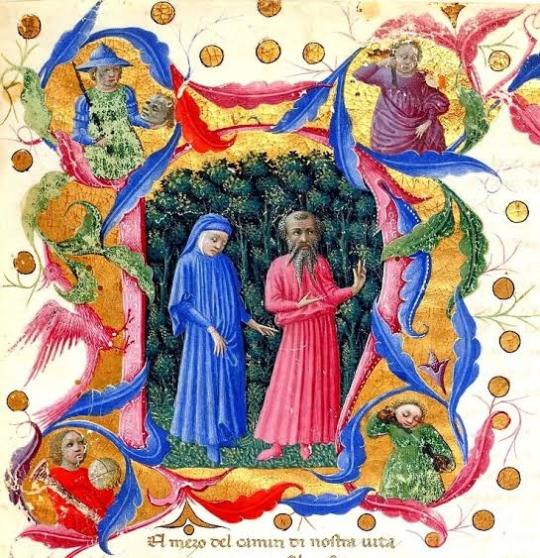
☝️☝️ There it is! That's literally Marius & Amadeo. Hahaha!
I have so so many thoughts about the setting of TVA. It's the most prominent and interesting theme in the book to me. I was heavily fixated & obsessed with turn-of-the-century Italian Renaissance history for a while, so starting to read TVA and slowly realizing this book is set in exactly those years, how Armand's conflict corresponds exactly with the history & theology of that brief period was... an Experience. LOL.
Amadeo's rebirth into his new life being set in a time where Christian faith & culture is being reborn. The Siege of Constantinople and Andrei's kidnapping. Savonarola's Bonfire of Vanities and the Children of Darkness ambush. The constant comparison with Christ's rebirth ... It is so deeply imbued with the conflicting values of the Italian Renaissance. Even Marius, too, represents that - an ancient roman teacher to offset & challenge Armand's very Christian, very spiritual devotion. The book, to me, is Armand's Divine Comedy!
I debated on which painting to imitate for this idea, and ended up choosing the one depicting Canto 32 - Dante & Virgil witness Ugolino della Gherardesca, eternally gnawing on his betrayer's head in hell. Kind of as a little nod to how Armand cannibalizes Riccardo later on.
336 notes
·
View notes
Text
















the vampire armand: a case study
109 notes
·
View notes
Text

my beautiful princess with a disorder
3K notes
·
View notes
Text
today i am thinking about one of louis de pointe du lac’s primary character traits being his eagerness to punch down and how i feel as though this aspect of him gets incredibly defanged within most discussions of him. far from a helpless fool or a stereotypical perfect victim, louis’ relationship to his own victimhood at the hands of lestat, armand, and wider systems of white supremacy is deeply complex. he is a character that comes from a sharecropping family that can no longer turn a profit—likely because of their race—and so he turns to a mechanism of exploitation of primarily black women where we see him onscreen basically tell one of those black women she’s overreacting to being sexually assaulted, and i believe this is because louis not only sees the alderman as too important for a sex worker to criticize, but also as someone he’d like to emulate and have the same social respect as because of a false belief it will relieve him from his subjugation.
louis is a character that is convinced he *deserves* a lot—deserves wealth, deserves a seat at the white man’s table because of his willingness to exploit whatever economic avenues are available, etc. he advocates for himself to “deserve” these things through his participation in primarily misogynoir—his dehumanizing treatment of miss lily for instance, up to and including him and lestat’s first time happening *over her unconscious body* and him not realizing she’s dead until he’s seeking out emotional comfort. it’s essential to note none of this actually erases the realities of white supremacy and that again and again, louis is victimized by it, and again and again he struggles against it with very little tools and no solidarity with others or solidarity from others to him (including lestat’s refusal to understand his experiences when he is the only person in his life for seven years). of course this extends to his treatment of claudia, who, in his misogyny, he was hardly able to comprehend having her own internal world that extended beyond his and lestat’s fight over who she “takes after”/who should be her primary patriarch.
we even see it in his threatening of grace, a character the fandom is honestly incredibly unkind to in their interpretations, despite her being extremely reasonable as she sees her brother participate in systems of exploitation and become increasingly violent. in their relationship i really do believe vampirism is primarily a metaphor for the parasitic ruling class and that louis’ insistence on self actualizing himself and providing for his family at the expense of others is one of the primary reasons their relationship dissolves. grace, who married levi (dark skinned, implied to be less wealthy) doesn’t seem as interested in as florence in staying bourgeois for instance. i could make an entire post about how complicated grace and louis’ relationship is and defend grace dpdl all day but that’s for another post.
of course it is lestat who is the head patriarch, mostly by virtue of his whiteness and ability to weaponize it, where he places louis in what’s referred to as a “housewife” like position. once lestat is displaced however—in this case through death—louis’ strangulation on claudia (who is structured in the story as being a replacement for the brothel workers) tightens significantly. claudia is kept from being her own person by both lestat and louis, to the point where she starts omitting things from her diary like her own dreams probably bc she is afraid louis will betray her trust and peruse them again. and dreaming is a very literal internal world—one claudia keeps away from louis bc of how he’s abused access to it in the past, up to and including her sexual encounters. it also doesn’t escape me that the way he discusses her experience with bruce is very reminiscent of fathers believing their daughters have become “unclean”—centering a violent revenge narrative of murdering bruce before really extending anything emotionally helpful to claudia. and *of course* he can’t be emotionally helpful to claudia, because he hasn’t even processed his own experiences with lestat coercing him into companionship and sex.
but he still understands it deep in his bones, the anger and shame it makes him feel, and we see him direct this inability to grapple with his own victimhood to armand, whose victimhood he mocks (also by using language like “good nurse” and “little bitch” both bc because being a victim is emasculating as lestat emasculated him and because if louis sees armand as less of a man he doesn’t need to provide him with emotional bandwidth to consider how their experiences might mirror each other and make louis come to terms with his own abuse). i find the 2x4 bts really interesting because jacob describes seeing armand as more of a “doormat” and “easier to manipulate” than lestat, which is a big motivation for seeing him as a potential companion (and let me actually make the caveat i don’t think this is malicious but moreso that he sees armand as something that needs protection and by golly does ldpdl love resolving himself to save people that might not even need it) and even though this turns out to be untrue, i still think it’s a fascinating look into how louis rationalizes his relationship with armand and how he does see it as a mechanism to reclaim his power and with it his manhood.
in sanfran specifically, he even targets gay men (and v likely survival sex workers with what we know of daniel) during the AIDS crisis, an incredibly vulnerable group that could be killed without any attention from members outside of their community. he lives in dubai where he and armand (also a big fan of punching down on the most vulnerable) keep a blood farm and employ primarily south asian migrant workers in an economy built on the slave labor of those communities. louis is a character that i believe likes to have a layer of separation from cruelty, and a man who wants to be good, but who also has no qualms about using exploitative systems and circumstances to make things convenient and/or affirming for him.
he’s just as complicated as every other character in the show but discussion of him either swings in the direction of refusing to discuss his participation in abuse ever, and it’s frustrating particularly with how much it disregards claudia’s own recollection of her experiences, but at the same time you can hardly fault people for that bc it’s an overcorrection to the other way it swings—where louis is positioned as lestat’s abuser with the same sort of racist defamation 2x7 spent its entire runtime deconstructing. but regardless, iwtv is fantastic at showing how “abuser” and “abused” are not stagnant categories and how many of the characters we empathize with as victims will participate in subjugation of others 1. because they want to be their own person and 2. they’ve only ever seen individuality and power as represented by unilateral violence at the hands of their abusers.
i’m rlly rlly interested in where this will go in s3, because so much of his interview was about accountability for what he did specifically to claudia, but i also love him as the “most vampiric vampire” and how a vampire, by virtue of their existence, cannot escape hurting others. louis just doesn’t necessarily do it through hunting humans for blood, but by hunting them for labor. he devours them still, just in a very different way.
283 notes
·
View notes
Text
Armand’s commitment to portraying victimhood (re: his relationship with Louis and his involvement in the trial, not throughout his life) and passivity and plausible deniability is impressive but it’s also deeply connected to his self-image. He’s not “playing the victim” in an overtly duplicitous manner as he is unable to conceptualize of himself in any other role besides submission (he’s being covertly duplicitous, though). People do things to him, things happen to him, but he’s not an active participant in his own life. It was like that for him for a long time, chased down by slavers, sold into slavery, purchased by someone who continued to traffic him, etc. He can’t really imagine himself occupying any other role besides one of total passivity so he simply re-orients his role in any situation, no matter how active, into one of passivity. He doesn’t have the grammar to describe himself in an active role. It’s not a story he knows how to tell. It’s also easier to tell himself he didn’t have a choice, like at the trial, because it exonerates him from responsibility. He doesn’t have to be responsible for all these terrible things, he had no choice, his hands were tied. He avoids real responsibility, real blame, real possibility of rejection through passivity. It’s not his fault if he didn’t do anything. It’s not his fault if things happen to him. I think he’s uncomfortable with the power he wields on some level. He enjoys it, but I don’t think he would ever admit it. He’s a total control freak who has no problem punishing people, but he still justifies it as something he “has” to do, because those people have broken rules, or because it’s for their own good, which exonerates him from any real responsibility, because he had to do it, it wasn’t his choice, even if it was. He likes wielding power without having to be responsible for that power, he’s even uncomfortable having agency. It’s an undeniable fact that his powers grant him immense strength, power, and control over any situation, but he never uses his mind reading abilities during the interview, and he doesn’t use any of his other powers except for flight, when he’s scaring Daniel into submission. I don’t know if he enjoys having that power. On one hand it’s a security blanket, if things go really wrong he can rag doll everyone and preserve himself, he doesn’t have to be afraid, on the other it’s terrifying that it gives him agency and free will and makes him responsible for his own life and his own happiness and his own choices. He’s so used to doing what people make him do. He’s so used to letting people do things to him. He’s so used to letting things happen to him. At this point, being controlled and manipulated is what makes him feel safe. Half of him wants to go back to when he was genuinely powerless because it’s the last time he felt safe, as fucked up as that is, and the other half is terrified of ever losing power and control even for a second, because of all the terrible things that happened to him when he was powerless. So he’s trapped in this cycle of committing himself to victimhood and passivity and total avoidance of responsibility because anything else is too scary, but simultaneously it’s also too scary to ever get hurt again, and he can’t trust anything or anyone to not hurt him, so he can’t let go of the reins even for a second, and it’s everyone else’s fault they’re making him hold these reins even though he really didn’t want to and he prefers to be a passenger princess!
380 notes
·
View notes
Text
Armand loves so completely and with so much devotion that literally no one can match his freak and then he gets disastrously upset when people won’t hollow themselves out with carving knives and hand him their insides as proof of their devotion and then everyone has to suffer because he doesn’t understand that’s not what love is to most people. He went to the trouble of bringing all the silverware and now no one wants to carve out their hearts and give them to him even though they said they loved him? And here he was, ready to serve up his insides on a platter, only to be met with the coldness of this so-called lover. Liars, all of them.
7K notes
·
View notes
Text
I stole this from Reddit:
Did y’all know Anne Rice wrote a standalone erotic short story about Armand for Playboy in 1979 which was canonically, in-universe, something Armand told Louis about, then Louis told Daniel about in the interview but Daniel left out of the book? During which Armand has some kind of kinky vampire threesome with two girls?

40 notes
·
View notes
Text






























A begging to be loved
- Armand, Amadeo, Arun Interview With The Vampire
Interview With The Vampire // 520 Studios // Bright Dead Things, Ada Limon // The 17-Year-Old & the Gay Bar, Danez Smith // Sara Teasdale // unknown // The Haunting of Hill House, Shirley Jackson // The Raven Boys, Maggie Stiefvater // unknown // Song of Myself, Walt Whitman // Citizen Illegal, José Olivarez // Virginia Woolf // unknown // unknown // Dear Dictator, Saint Motel // Litany in Which Certain Things Are Crossed Out, Richard Siken // David Levithan // The Hours, Michael Cunningham // Sue Zhao // Teaching the Dog Not to Nip, Jim Moore
2K notes
·
View notes
Text
Armand lived in Venice during the absolute sluttiest period for mens’ clothes and I gotta talk about it.
Anne constantly used Botticelli as a reference for clothes (who was at his peak in the 1470s/1480s) but Armand was in Florence when Savonarola died, which puts him in Venice the late 1490′s. Fashion was moving fast, there was a big moral panic over society falling apart and becoming too secular, and in Venice it was time to let your inner ho out.
The look: Short. Tight. Made of as many expensive scraps as possible.
Let’s get into it.
Keep reading
731 notes
·
View notes
Text








2x4 / fuck me eyes - ethel cain / tva / 2x8 / tva / ethel cain
50 notes
·
View notes
Text
Let’s be honest, therapy would only make them worse





849 notes
·
View notes
Text
Art in the subterranean room of the Théâtre des Vampires
It was the terrible ‘Triumph of Death’ by Breughel, painted on such a massive scale that all the multitude of ghastly figures towered over us in the gloom. Those ruthless skeletons ferrying the helpless dead in a fetid moat or pulling a cart of human skulls,


beheading an outstretched corpse or hanging humans from the gallows.


A bell tolled over the endless hell of scorched and smoking land, towards which great armies of men came with the hideous, mindless march of soldiers to a massacre.

I turned away, but the auburn-haired one touched my hand and led me further along the wall to see ‘The Fall of the Angels’ slowly materializing, with the damned being driven from the celestial heights into a lurid chaos of feasting monsters (...) above to the very height of the mural, where I could make out of the shadows two beautiful angels with trumpets to their lips. And for a second the spell was broken.


The candle rose. And horrors rose all around me: the dumbly passive and degraded damned of Bosch, the bloated, coffined corpses of Traini, the monstrous horsemen of Dürer



The very ceiling writhed with skeletons and moldering dead, with demons and the instruments of pain, as if this were the cathedral of death itself. - Interview with the Vampire
Anne Rice, in the Vampire Companion:
I was very interested in the Northern European artists at that time - Brueguel, Dürer, Bosch - painters who I felt were absolutely grotesque in many regards.
55 notes
·
View notes
Text




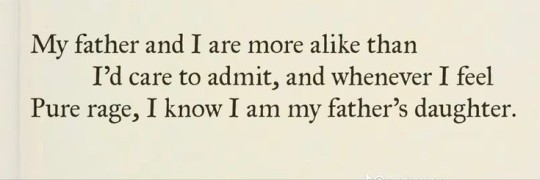








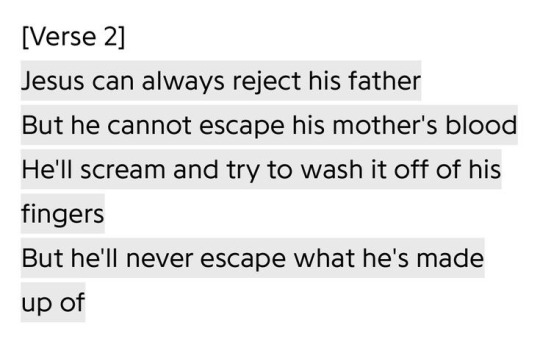







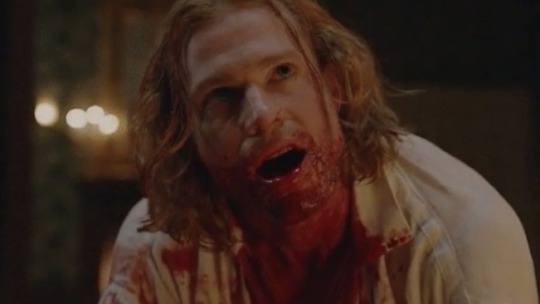
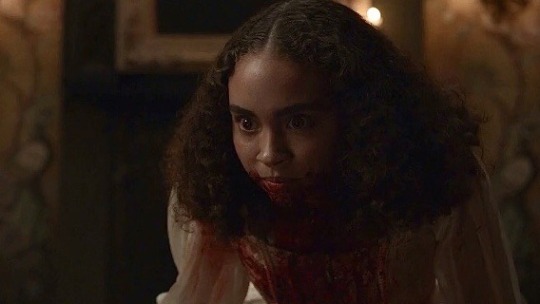







"To have committed no crime but that of being a daughter"
- Claudia and Lestat
interview with the vampire // joan macleod, the shape of a girl // sophokles // holyaches on X // Hélène Cixous, Stigmata: Escaping Texts; from ‘Love of the Wolf’, tr. Keith Cohen // traci brimhall, Lullaby on Mount Moriah // ocean vuong, on earth we're briefly gorgeous // dhermann hesse, demian // Hélène Cixous // ethel cain, family tree // chen chen, poplar street // fatima aamer bilal, i am not a person that can be loved for a very long time // sharon olds, I wanted to be there when my father died // desireé dallagiacomo // melancholymist on tumblr // kyung-sook shin, Please Look After Mom // ocean vuong, someday I'll love ocean vuong
809 notes
·
View notes